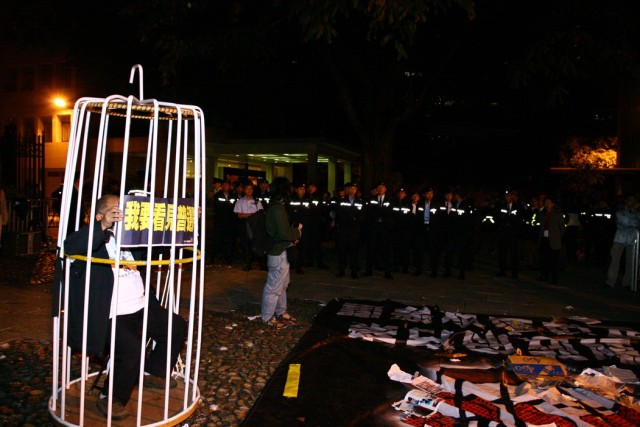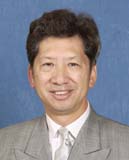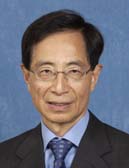
Police officers besieged a protestor in a cage
Hong Kong protesters call for democratic elections
By Keith Bradsher
New York Times
December 5, 2005
A huge throng of pro-democracy protesters poured through the skyscraper canyons of Hong Kong on Sunday afternoon, defying warnings from senior Chinese officials who refuse to set a timetable for general elections here.

Police officers besieged a protestor in a cage
The march continued well past sunset, as more and more men, women and children of all ages emerged from side streets and subway stations to join. Organizers estimated the peaceful crowd at 250,000 while police put it at 63,000.
At either measure, the turnout was surprising because Hong Kong's economy is booming, unemployment is falling and the city now has a popular and charismatic chief executive, Donald Tsang.
The push for full democracy poses an acute problem for China's leaders. They have declared it unlawful even to ask for a timetable for popular elections in Hong Kong, which Britain returned to Chinese rule in 1997.
At a news conference late Sunday, Tsang said that he wanted full democracy here in his lifetime and that he shared the aspirations of many of the protesters. But he also insisted that the legislature vote on Dec. 21 on a plan he drafted that would permit only limited political changes in the near future.
These changes would include allowing 1,600 people to vote for the chief executive in the next elections in 2007, up from 800 now. Tsang's plan would also expand the legislature slightly in 2008, although business and professional groups would still be allowed to choose nearly half the lawmakers.
The protesters want one-person, one-vote elections for the chief executive and all members of the legislature.
Late into the night, a crowd of protesters peacefully occupied the plaza between the main government buildings here, a gated area usually closed to the public but opened to marchers in a conciliatory gesture by the government. Ronny Tong, a prominent pro-democracy lawmaker who was in the crowd, said after the protest that Tsang's legislation would fail.
"The bill requires support from 40 of the legislature's 60 members, and the legislature's 25 pro-democracy members will all vote against it," Tong said.

Ronny Tong
Tsang said that he would consider ways to change his proposal but noted that he had limited scope for doing so. China's leaders and Hong Kong tycoons have opposed greater democracy here, fearing that it could set a precedent for challenges to one-party rule on the mainland and for higher taxes and greater government spending in Hong Kong itself.
Martin Lee, the founding chairman of the Democratic Party here, said that the day's march had only been about democracy in Hong Kong itself. But Lee Wing-tat, the party's current chairman, acknowledged last month that if officials in Beijing accepted a timetable for democracy here, it would be much harder to turn down similar demands that might surface later in Shanghai and other large Chinese cities.

Martin Lee
Hong Kong's population has grown tenfold since the end of World War II, mainly through immigration from the mainland. The opening of the border in recent years has resulted in broad awareness on the mainland of events in Hong Kong.